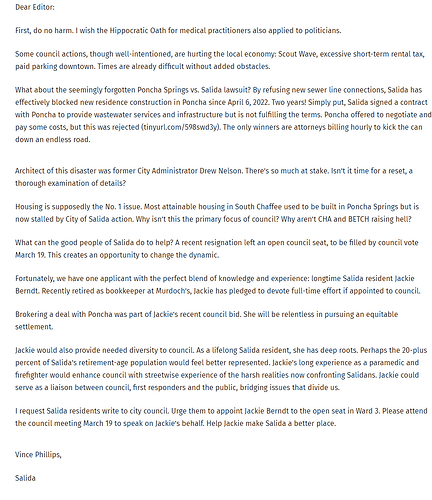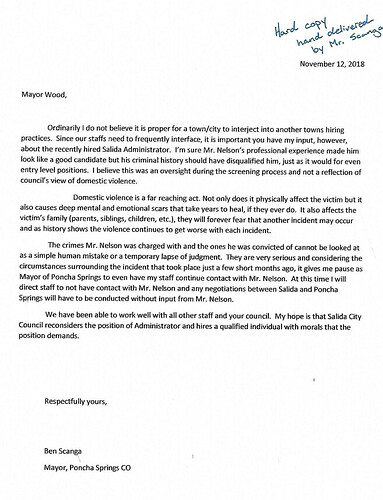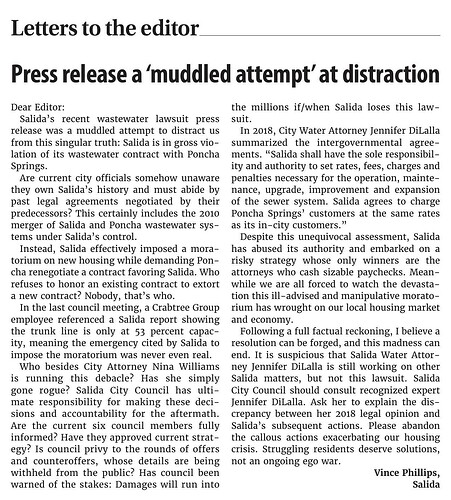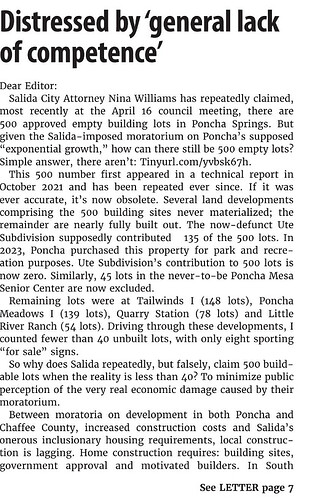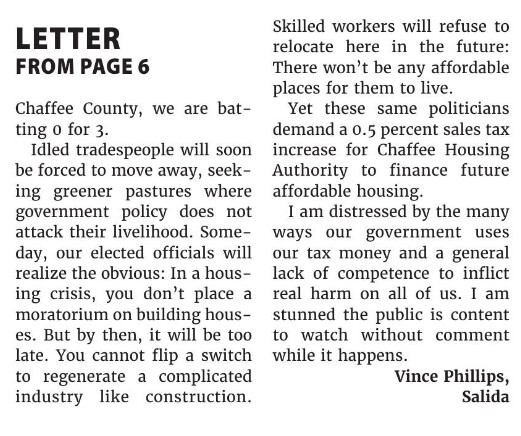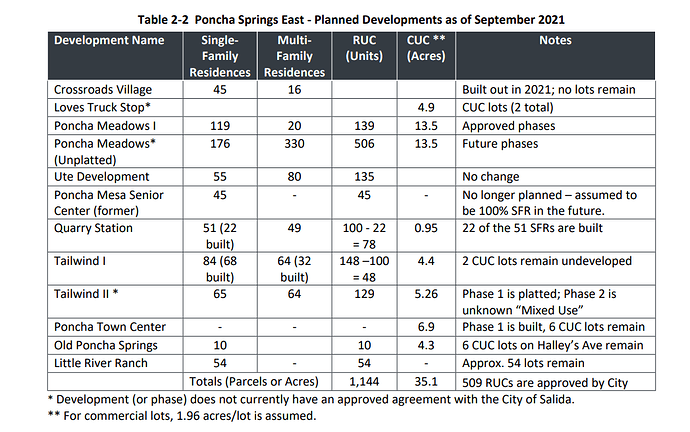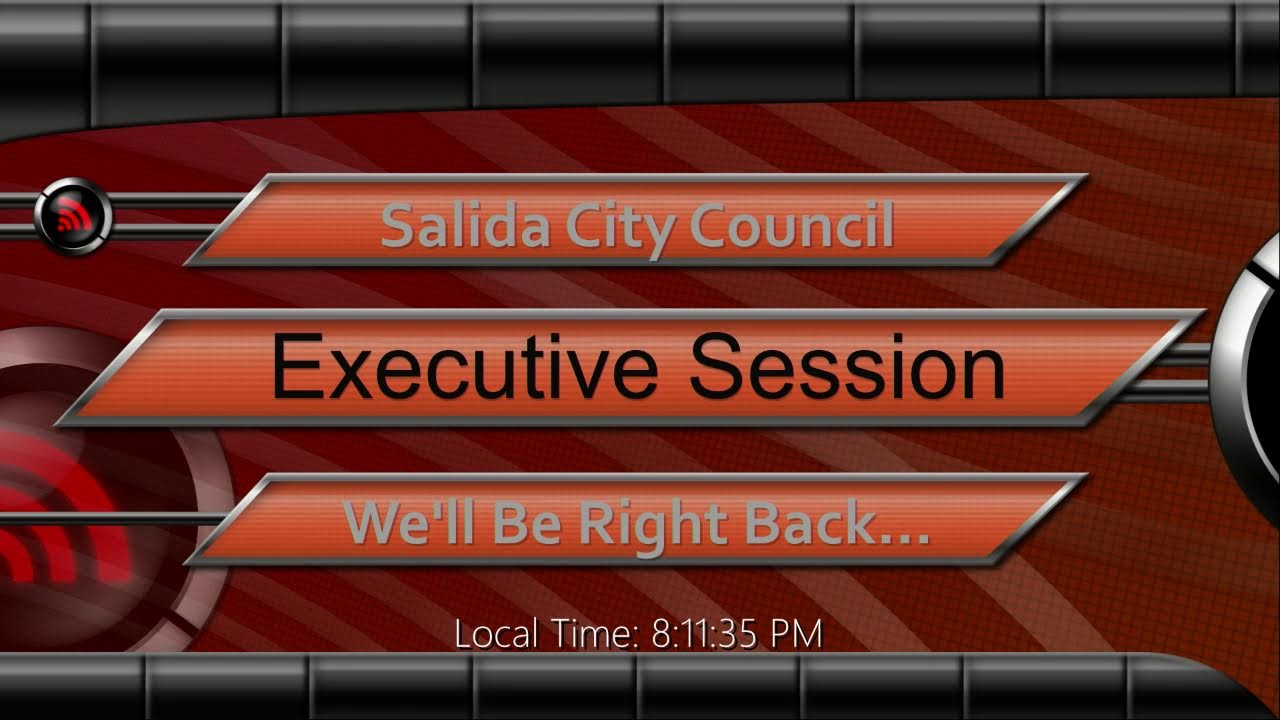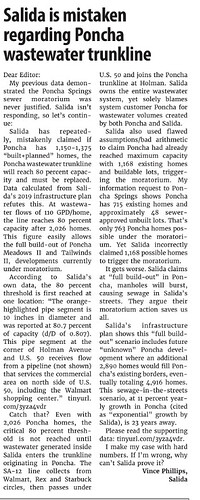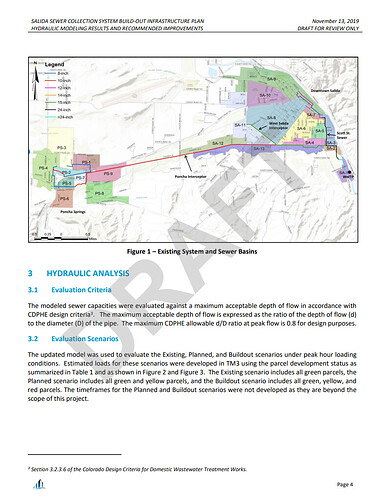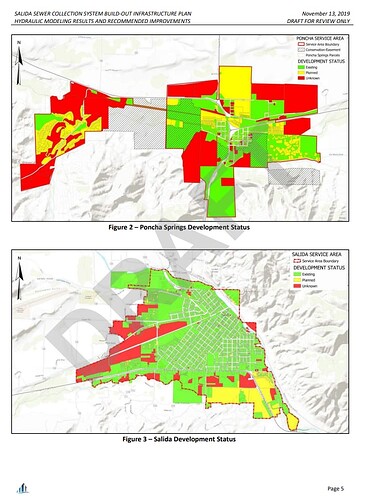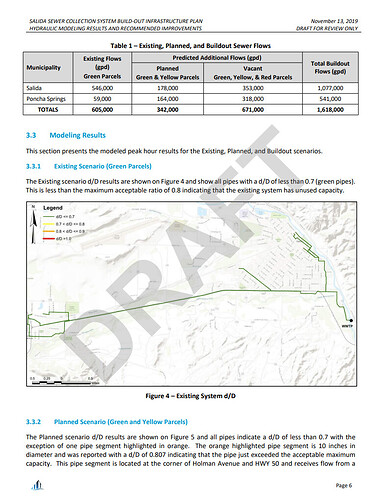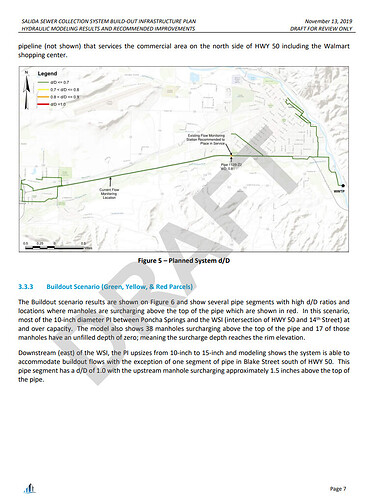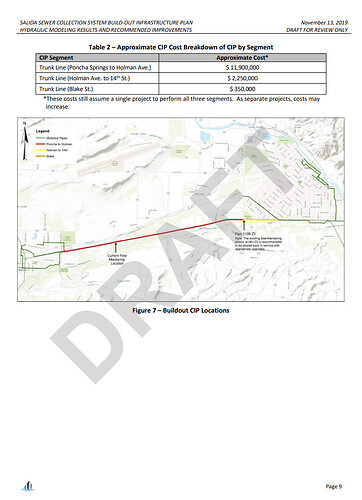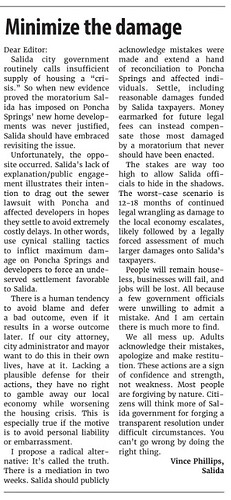Dear Editor: Urges council to appoint Jackie Berndt | Opinion | themountainmail.com
Lawsuit, Poncha Springs developments remain stalled | Local News | themountainmail.com
Lawsuit, Poncha Springs developments remain stalled
- Guinnevere Stropes, Mail Staff Writer
- Mar 21, 2024 Updated Mar 21, 2024
Movement on the Poncha Springs versus Salida lawsuit involving the Poncha interceptor and trunk line capacity has been “delayed, weeks each time, solely due to the Plaintiffs (and usually due to the developers),” Salida City Attorney Nina Williams wrote in a March 21 email.
After hearing public comment from Carrie Mesch at the March 19 Salida City Council meeting, The Mail contacted the parties involved about the status of the lawsuit filed by the Town of Poncha Springs and two developers against the City of Salida due to the Poncha interceptor and trunk line capacity.
Mesch owns the Poncha Meadows property, which she said is planned to be developed as workforce and community housing. She said her development is one of two affordable housing developments that have been halted due to the lawsuit. Mesch is one of the two developers involved in the lawsuit.
Mesch wanted it to be noted that any opinions or comments she makes regarding the lawsuit are her own and do not represent the other individuals involved in the lawsuit.
“It came to my attention that we’re not sure the decision makers know the whole story – we need a different perspective. I don’t know where Salida sits in knowing (the details) of the lawsuit,” Mesch said.
Williams said, “It is extremely frustrating that they are complaining about delay, when they are the ones who brought this lawsuit, which ended settlement talks.”
Williams said it was “frustrating” to hear Mesch’s comment, as it “ignores the fact that the city warned about her specific development in March of 2020.”
Mesch said that during a 2018 work session, Salida Public Works Director David Ladyexplained to city council that “eventually” the trunk line would need to be expanded, estimated to occur in 2033. She said the trunk line will not meet capacity until all 150 acres of her development are completed, of which she has finished 30 acres.
Mesch said according to the 2010 intergovernmental agreement signed by Salida and Poncha Springs, the city is responsible for the planning and upgrading of the trunk line, which they “didn’t do.”
“It’s not 50/50,” Mesch said. “Not by law, or the intergovernmental agreement.”
Williams quoted Section 7 of the agreement, which states, “Poncha Springs’ future development shall not be limited by the Sewer System, its construction, operation or maintenance, provided that the costs of construction and expansion of the Sewer System are not paid for by the existing rate payers but that the costs are borne by the future development.”
Williams said the “unprecedented growth” seen in Poncha Springs is being cited as the sole cause for the capacity issues with the trunk line. In 2020-2022 Poncha saw a 34.8 percent increase in population, the third fastest growing town in the state, Williams said, referencing an article in The Colorado Sun May 18, 2023.
Mesch said despite the growth seen in Poncha Springs, the intergovernmental agreement clearly states it is the sole responsibility of the City of Salida to upgrade the Poncha interceptor and trunk line to allow for greater capacity. Williams said in her Poncha Sewer Moratorium Ordinance, read aloud to council in 2023, that if it wasn’t for the “exponential, unprecedented and unplanned growth within Poncha Springs, the capital upgrades to this interceptor would not be necessary.”
In her moratorium ordinance, Williams continued, “No development within the City of Salida, or outside these properties serviced and benefiting from the Interceptor, is creating the need for these expensive improvements. These upgrades only benefit the brand-new residential development in Poncha Springs.”
As of now, there have been few updates in the way of moving the case forward, and Mesch said this development is critical to both Salida and Poncha Springs. She called affordable housing her “passion.” She added, “Here we have a city holding it off. It’s a big hit when you can’t continue the work.”
Dear Editor,
Does Salida City Attorney Nina Williams believe contracts are non-binding?
By definition: “A contract is an agreement between parties, creating mutual obligations that are enforceable by law”.
We all know this. Attorneys should too!
But in Salida, our City Attorney advocated Council sign a disastrous, supposedly non-binding paid-parking contract.
And what about the Big-Bucks Poncha Springs wastewater lawsuit? To summarize:
Salida officials wanted Poncha to pay more than Salida for wastewater infrastructure.
The 2010 IGAs, contracts between Salida and Poncha, expressly forbid this action.
Salida unilaterally declared the contract “outdated” and refused wastewater tap access for future Poncha construction: IGA Transfer Agreement Paragraph 2(a).
To restore Poncha construction, Salida demanded renegotiating the contract to formalize Poncha paying higher rates than Salida.
Breach of contract? Coercion? Poncha apparently thought so, and sued Salida.
Was disgraced former City Administrator Drew Nelson the architect of this regional family feud? After his hire in 2018, news of Drew Nelson’s domestic violence arrest rocked Salida. Mayor Ben Scanga sent a concerned letter to Mayor PT Wood, questioning the hire and informing Salida that he would deny Drew contact with Poncha Staff, hoping instead Salida “hires a qualified individual with morals that the position demands.”
Ask a Salida official, why did this lawsuit happen? A common response is because Ben Scanga is a . Who originated this negative characterization of respected Mayor and business leader Ben Scanga?
One possibility: after narrowly avoiding being fired in 2019, did Drew Nelson weaponize his authority over wastewater expansion to retaliate against Ben Scanga for speaking against Domestic Violence? Is this entire episode the result of a personal vendetta?
Besides lacking a basic understanding of contracts, why would Nina Williams support this flawed and risky action against Poncha? Reminder: the City Attorney was arrested for DUI in Salida in 2022, with Drew Nelson as passenger. Many who watched the bodycam video questioned whether their relationship had transcended the professional. Could personal entanglement have compromised the City Attorney’s legal judgement?
Why is Council allowing Nina Williams, seemingly unsupervised, to manage this Poncha lawsuit?
And guess who got paid to defend Drew Nelson against claims filed by female former city employees?
In 2023, the city attorney’s firm billed Salida $243,698.57. For that much scratch, shouldn’t they advise preventing lawsuits instead of fostering them?
And again: If housing is so important, why is Salida imposing a Poncha moratorium?
Vince Phillips, Salida
===================================================
==================================================
City of Salida attorney billing for 2023 and the start of 2024.
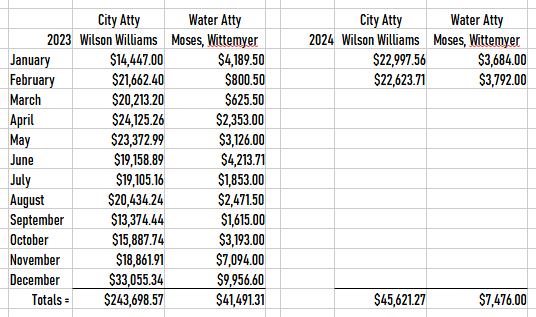
The following website contains links to the two Intergovernmental Agreements(IGAs)
dictating terms between Salida and Poncha Spring for wastewater handling.
There is also a link to the Town of Poncha Springs position statement, including a timeline of events:
City of Salida Press Release referred to in previous letter:
Salida, CO- In 2017, the City of Salida began communicating concerns about the size of the Poncha Sanitary Sewer Trunk Line that flows from Poncha Springs through Salida to the Wastewater Treatment Plant. The City notified the Town of Poncha Springs, as well as local developers, that the Trunk Line is undersized and unable to handle the projected future growth of the Town, noting that the capacity of the Wastewater treatment plant was not a concern.
Since that notification, the City of Salida has completed plans to replace the Trunk Line and alleviate the capacity issues so the Town of Poncha Springs could allow for their projected growth, knowing that the time and financing capacity to complete such a large project could be years.
Salida and Poncha Springs’ officials participated in mediation in 2023, which was unsuccessful in reaching a solution to fund the trunk line replacement. The City has long operated within the policy that new development will pay the upfront costs of new or expanded infrastructure needed to cover the additional demand for the pipeline. The City maintains that these costs should not be solely borne by existing rate payers, either within the City of Salida or Town Poncha Springs, who are not contributing the additional loads. The Town of Poncha Springs, as well as Tailwind Group LLC and Full Views Matter, LLC brought suit against the City, maintaining that the costs of the Poncha Springs Trunk Line should be paid for by all customers within the system.
The City Council, who also serves as the Water and Sewer Enterprise Board, has set goals related to the community infrastructure and fiscal responsibility to ensure proper management of the water and wastewater system assets. Mayor Dan Shore stated that, “The City of Salida is committed to protecting existing rate payers in both communities from financing a multi-million-dollar project that does not benefit them while continuing negotiations with the Town of Poncha Springs to find a solution.”
While the City is still honoring current sewer line agreements, which allow for new building permits to move forward, due to the size of the Poncha Trunk Line project, there is a need for financing and a settlement with the Town of Poncha Springs on how the pipeline is paid for new connections for future subdivisions to be approved. The engineered design drawings were completed in 2023 and Salida is ready to move forward with improvements pending a re-negotiated IGA with the Town of Poncha Springs and procurement of financing for the project.
The City of Salida remains open to collaborative discussions with the Town of Poncha Springs and developers to explore viable solutions to fairly address capacity constraints and manage growth in a manner that protects the interests of both communities. We believe that through dialogue, cooperation, and shared responsibility, we can identify feasible options for ensuring the continued provision of essential services while safeguarding our shared resources for future generations.
Below is an NRCDC memo written by former Salida City Attorney Ben Kahn, showing the similarities between the City’s actions then and now. Then, Salida raided the water and wastewater $$$ reserves to pay off the NRCDC mortgage and raised all the user rates.
Ben did a fantastic job and it is chock full of great information that many either didn’t know or have forgotten.
NRCDC 12312016_NRCDC-SOF-Final.pdf (467.8 KB)
Dear Editor: Incentives, not obstacles, needed to build affordable housing
- May 1, 2024
Dear Editor:
Who told the City of Salida they should play land developer? They have proven lousy at it.
Remember the Vandaveer/Natural Resource Center Development Corp. (NRCDC) debacle? Tinyurl.com/2feunw7r.
The promised rec center and city-created affordable housing never materialized, but chaos reigned and Salida taxpayers lost millions. Even NRCDC champion Dara MacDonald finally admitted many mistakes and private development was the answer.
But instead of focusing on core functions, Salida again wants to play developer. Is Salida’s desire to generate funding for pet projects now influencing council policy?
If trunk line capacity was problematic, Salida had a contractual responsibility to finance an upgrade. Instead, they sat on their hands, waited until they could declare a crisis and issued a moratorium on Poncha building until non-Salida residents agreed to pay a doubled rate. I call it Wastewatergate because it’s scandalous. And where has all the unprecedented revenue gone from tap fees derived from Poncha’s “unprecedented” growth?
Nina Williams attributed the plight of the unfunded trunk line to scarcity of infrastructure grants. Meanwhile, the City of Salida has been aggressively fundraising for its own South Ark development pet project (aka Jane’s Place 2.0). Salida recently announced South Ark received $4M in infrastructure grants, plus $1M each from Chaffee County/CMC, while council pledged another $1.25M. Salida proved they understand how to raise funds for infrastructure, but only for their own priorities.
The upcoming vote on the Salida Inclusionary Housing Ordinance amendment doubles down on the money-grab by expecting developers to pony up even more resources before they’re allowed to build. Once again, these policies exacerbate the housing problem, while offering no relief.
This valuable cream skimmed off the top goes to either Salida or one of its South Ark partners: CHA or CHT. All roads lead to South Ark.
If it passes, new inclusionary housing rules will end most Salida development. The terms are soul-crushing. If developers can build elsewhere, they will. Unless of course they are stymied by the epidemic of moratoriums in Chaffee County.
Salida has been pushing inclusionary policies for years, and the housing situation keeps worsening. Their policies and moratoriums take a bad situation and make it worse.
Why not try incentives making it easier to build affordable housing, instead of obstacles making it harder to build anything? How about policies that make it less expensive to build, not more expensive?
Vince Phillips,
Salida
Dear Editor: Council policies don’t create affordable housing
- May 16, 2024
Dear Editor:
Salida says they want affordable housing. Their actions say otherwise. Instead of facilitating construction, Salida punishes builders with enormous fees while enforcing moratoriums. How does this create affordable housing? It doesn’t!
Council sought and rabidly defended the highest short-term rental tax in Colorado, deterring visitors and damaging our economy. Sabotaging business harmed the very workers council claims they help. Meanwhile, collected tax payments are hoarded in council’s personal, discretionary housing fund.
Royal tribute is commanded before developing property in Salida, including land donation, in-lieu-of cash payments and/or taking a loss by forced quotas of “deed restriction.” These policies deter builders while simultaneously increasing overall housing prices.
Council rightly determined affordable housing is falling further behind, but wrongly their own policies cannot be the problem. Private developers, who complied with council policies and paid up must be the problem! So, council decided to replace them, becoming land developers themselves using everyone else’s money.
But unallocated funding is scarce. Luckily, council can seamlessly swap multiple hats to generate cash on demand to fund pet projects.
Using their Salida Council hat, they enacted stringent inclusionary housing requirements. In almost all cases, if anyone builds, Salida or their NGO surrogates get paid.
Using their Wastewater Board hat, council enacted a moratorium on building while demanding new Poncha homes pay tap fees double that of Salida. Would this extorted money ever be used on the new trunk line, or instead funneled to finance Salida’s priority, South Ark?
Salida will never perform a full accounting, but the NRCDC cost Salida taxpayers millions. Officials back then flagrantly abused their power; now it is happening again. Heed this cautionary tale!
Why aren’t local housing advocates speaking out on the Poncha lawsuit? Dirty little secret: CHA, CHT and BETCH are not in the “housing” business. They are in the “collect money for housing” business. The primary objective of bureaucracies is their own survival and prosperity, aka securing funding from government sources to pay their own salaries. CHA, CHT or BETCH will not challenge Salida’s damaging policies. That would be biting the hand that feeds them.
To compound their mistakes, council believes the job is done once funding is allocated. But who tracks how effectively money is spent? Certainly not Salida. No one ever follows the money.
Salida is doubling down on terrible policies. The resultant failure will be as epic as it is avoidable.
Vince Phillips,
Salida
Dear Editor: Blindly trust moratorium?
- May 30, 2024
Dear Editor:
Where is the evidence justifying the Poncha moratorium? Why can’t we see it?
Because I keep hearing the trunk line flow Poncha is fine, except for a bottleneck in Salida where the systems connect. This bottleneck is where the supposedly “alarming” flow is measured. Fixing the bottleneck would give the current trunk line many additional years of service, allowing time for financing future upgrades. Instead, Salida’s is only willing to consider a $17M replacement line.
Current council never voted on this moratorium; the last council passed it. Why doesn’t the current council request a detailed public briefing about trunk line performance? The damage caused by this moratorium is incalculable. Housing supply and the local economy are suffering. If we were all working from the same facts, would a compromise present itself?
Speaking of sewage bottlenecks, Jim Miller was once again spewing mindless anger in violation of Mayor Shore’s Civility Pledge. Jim Miller is neither a City of Salida voter,nor a downtown business owner. Why is he on the mayor’s Parking Task Force?
And while Mr. Miller’s invitation to attend council is touching, his history of welcoming dissent is pretty lackluster. As reported in the Jan. 14, 2018, Mountain Mail: “Miller is charged with misdemeanor assault in an April 3 incident with Jan Sebastian after a Salida City Council meeting.“ View the surveillance video and judge for yourself: tinyurl.com/2f7ve4ry.
Simple summary of Salida’s parking woes: Paid parking was a money grab devastating to downtown business. Council wisely yielded to public pressure and canceled paid parking. Parking enforcement is not inherently evil, but enforcement of two-hour parking will harm the downtown economy. If council modified the parking code, perhaps to four-hour parking limits, with some 30-minute spaces, I and many others would fully support enforcement.
The same poor judgment that brought you Drew Nelson, Jim Miller and paid parking is now telling you to blindly trust the Poncha moratorium while denying public access to the evidence.
Many are no longer willing to speak at council meetings. Why bother when no one is listening?
Vince Phillips,
Salida
The Mountain Mail, 7/26/24:
=======================================
Calculations using the the data table below
Translates Gallons/Day into # Homes:
Report calculated Poncha Springs residential wastewater useage ag at 110 Gallons/Day(GDP)
***For Poncha Springs: ***
“Existing” 59,000 System GPD/110 GPD = 536 Homes
“Planned” 164,000 System GPD/110 GPD = 1490 Homes
“Unknown” 318,000 System GPD/110GPD = 2890 Homes
Note the area highlighted in Orange at Holman Ave/Hwy 50:
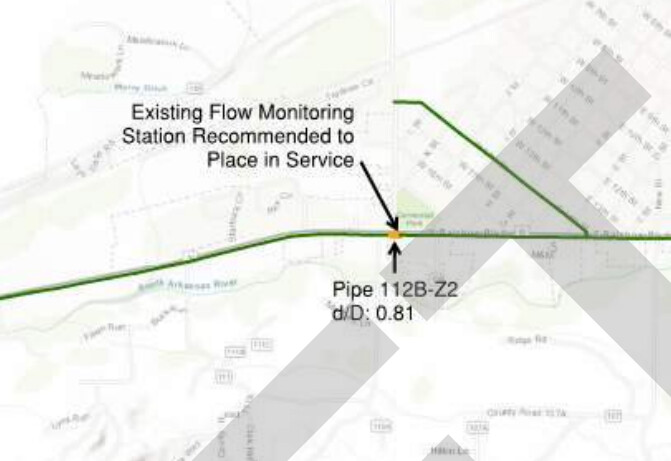
Moratorium Palooza
Dear Editor,
I respect those supporting the elected officials of their choice. This attitude used to be a hallmark of our society. But how can you defend politicians who say one thing while doing the exact opposite, enacting policies that harm all of us in the process? The lecture never ends: AFFORDABLE HOUSING IS A CRISIS IN CHAFFEE COUNTY! And I agree.
Yet over two years ago, the BOCC invoked a moratorium on most development in unincorporated Chaffee County. Lifting the moratorium depends on a revised Land Use Code that never comes. Who controls this revision? The same ineffective BOCC who invoked the moratorium.
Meanwhile, in Salida, Council imposed a moratorium on new Poncha Springs developments connecting to the wastewater system, effectively blocking the construction of most new Poncha housing developments for the same two years. My investigation shows the moratorium was never justified. Salida stands mute. Poncha Springs vs Salida: Wastewater Infrastructure Financing Lawsuit - #12 by PTBSkeptic - Chaffee County - Chaffee County Discourse
Yet these moratorium-happy Commissioners and Council members approved an issue for our November ballot asking us for a 0.5% sales tax increase to fund the Chaffee Housing Authority(CHA).
Conspiracy theorists might even believe local government is exacerbating the housing crisis to justify the tax increase!
But if the tax increase is approved, who controls the $3.5M/yr? The CHA Board is populated by familiar government officials, some already overseeing the moratoriums. tinyurl.com/ew6xx2c8
In a troubled world with limited resources, how can anyone expect the Chaffee Taxpayer to fund a tax needed to counter existing bad government policy? Can anyone explain?
Vince Phillips, Salida
